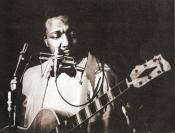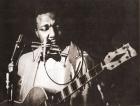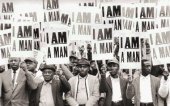I never will go back to Alabama, that is not the place for me
I never will go back to Alabama, that is not the place for me
You know they killed my sister and my brother,
and the whole world let them peoples go down there free
I never will love Alabama, Alabama seem to never have loved poor me
I never will love Alabama, Alabama seem to never have loved poor me
Oh God I wish you would rise up one day,
lead my peoples to the land of pea'
My brother was taken up for my mother, and a police officer shot him down
My brother was taken up for my mother, and a police officer shot him down
I can't help but to sit down and cry sometime,
think about how my poor brother lost his life
Alabama, Alabama, why you wanna be so mean
Alabama, Alabama, why you wanna be so mean
You got my people behind a barbwire fence,
now you tryin' to take my freedom away from me.
I never will go back to Alabama, that is not the place for me
You know they killed my sister and my brother,
and the whole world let them peoples go down there free
I never will love Alabama, Alabama seem to never have loved poor me
I never will love Alabama, Alabama seem to never have loved poor me
Oh God I wish you would rise up one day,
lead my peoples to the land of pea'
My brother was taken up for my mother, and a police officer shot him down
My brother was taken up for my mother, and a police officer shot him down
I can't help but to sit down and cry sometime,
think about how my poor brother lost his life
Alabama, Alabama, why you wanna be so mean
Alabama, Alabama, why you wanna be so mean
You got my people behind a barbwire fence,
now you tryin' to take my freedom away from me.
Contributed by Alessandro - 2006/9/13 - 11:39
Language: Italian
Traduzione italiana / Italian translation / Traduction italienne / Italiankielinen käännös: Marcello Tagliabue
ALABAMA BLUES
Non tornerò mai più in Alabama, non è il posto per me,
non tornerò mai più in Alabama, non è il posto per me.
Sai che hanno ucciso mia sorella e mio fratello,
e il mondo intero ha lasciato che quella gente andasse in giro libera.
Non amerò mai più l'Alabama, sembra che l'Alabama non abbia mai amato un povero come me,
non amerò mai più l'Alabama, sembra che l'Alabama non abbia mai amato un povero come me.
Oh Dio, vorrei che tu un giorno ti alzassi
a condurre la mia gente verso la terra della pace (1).
Mio fratello è stato arrestato a causa di mia madre, e un agente di polizia gli ha sparato, (2)
mio fratello è stato arrestato a causa di mia madre, e un agente di polizia gli ha sparato,
non posso fare a meno di sedermi e piangere ogni tanto,
e pensare a come il mio povero fratello ha perso la vita.
Alabama, Alabama, perché vuoi essere così malvagio?
Alabama, Alabama, perché vuoi essere così malvagio?
Tieni la mia gente dietro un recinto di filo spinato,
e ora stai cercando di portarmi via la mia libertà.
Non tornerò mai più in Alabama, non è il posto per me,
non tornerò mai più in Alabama, non è il posto per me.
Sai che hanno ucciso mia sorella e mio fratello,
e il mondo intero ha lasciato che quella gente andasse in giro libera.
Non amerò mai più l'Alabama, sembra che l'Alabama non abbia mai amato un povero come me,
non amerò mai più l'Alabama, sembra che l'Alabama non abbia mai amato un povero come me.
Oh Dio, vorrei che tu un giorno ti alzassi
a condurre la mia gente verso la terra della pace (1).
Mio fratello è stato arrestato a causa di mia madre, e un agente di polizia gli ha sparato, (2)
mio fratello è stato arrestato a causa di mia madre, e un agente di polizia gli ha sparato,
non posso fare a meno di sedermi e piangere ogni tanto,
e pensare a come il mio povero fratello ha perso la vita.
Alabama, Alabama, perché vuoi essere così malvagio?
Alabama, Alabama, perché vuoi essere così malvagio?
Tieni la mia gente dietro un recinto di filo spinato,
e ora stai cercando di portarmi via la mia libertà.
(1) in slang 'peas' sta per 'pace'.
(2) probabilmente il fratello è stato assassinato dalla polizia per avere difeso la madre.
(2) probabilmente il fratello è stato assassinato dalla polizia per avere difeso la madre.
Contributed by Marcello Tagliabue - 2025/10/26 - 14:54
J.B. Lenoir’s “Alabama Blues” is a rather well-known blues protest song. It stands out because, by the 1960s, it was increasingly rare for blues musicians to sing about poverty, despair, and social injustice. And, fifty years since the tune was recorded under the supervision of Chicago blues master Willie Dixon, its lyrics still carry a deep resonance.
Lenoir, who is a character in the song, expresses why he will never go back to Alabama. His sister and brother were killed in the state. The justice system let the killers go free.
Alabama is also a state he will never love because his brother defended his mother. Police shot him down. “I can’t help but to sit down and cry some times/Think about how my poor brother lost his life,” Lenoir sings.
In the song, Lenoir’s character decries the incarceration of his people “behind a barbed wire fence.” The song ends with Lenoir declaring, “Now you’re trying to take my freedom away from me.” Presumably, he now finds himself at risk of being shackled, chained, and imprisoned, however, what Lenoir means exactly is not defined.
“Alabama Blues” is a song of the downtrodden. It is not intended to inspire an uprising against the oppression. Internally, the character of the song may be praying for peace and freedom from suffering, however, he does not have any confidence that he will bring about this salvation. He must leave Alabama, if he even can.
To link it to the present: the New York Times has a report about southern states, including Alabama, where prosecutors are two to three times more likely to strike blacks from juries than other Americans.
It seems black Americans are killed by police nearly every other day yet the system of justice maintains features, which ensure officers who kill black people go free. It also enables prosecutors to incarcerate black people behind a “barbed wire fence” for petty crimes and largely forgivable offenses that should not ruin one’s future in life.
In fact, the only thing more troubling than the fifty year-old story in “Alabama Blues” is that it is increasingly evident it is not an Alabama story. It is not simply a tale of Southern life for black people. It is a modern-day American horror story, which Lenoir would have never thought would be extremely relevant a half century later.
da :
SHADOW PROOF-PROTEST SONG OF THE WEEK: ‘ALABAMA BLUES’
17 AUG 2015 - protestmusic@Shadowproof.com
Kevin Gosztola is managing editor of Shadowproof.
Lenoir, who is a character in the song, expresses why he will never go back to Alabama. His sister and brother were killed in the state. The justice system let the killers go free.
Alabama is also a state he will never love because his brother defended his mother. Police shot him down. “I can’t help but to sit down and cry some times/Think about how my poor brother lost his life,” Lenoir sings.
In the song, Lenoir’s character decries the incarceration of his people “behind a barbed wire fence.” The song ends with Lenoir declaring, “Now you’re trying to take my freedom away from me.” Presumably, he now finds himself at risk of being shackled, chained, and imprisoned, however, what Lenoir means exactly is not defined.
“Alabama Blues” is a song of the downtrodden. It is not intended to inspire an uprising against the oppression. Internally, the character of the song may be praying for peace and freedom from suffering, however, he does not have any confidence that he will bring about this salvation. He must leave Alabama, if he even can.
To link it to the present: the New York Times has a report about southern states, including Alabama, where prosecutors are two to three times more likely to strike blacks from juries than other Americans.
It seems black Americans are killed by police nearly every other day yet the system of justice maintains features, which ensure officers who kill black people go free. It also enables prosecutors to incarcerate black people behind a “barbed wire fence” for petty crimes and largely forgivable offenses that should not ruin one’s future in life.
In fact, the only thing more troubling than the fifty year-old story in “Alabama Blues” is that it is increasingly evident it is not an Alabama story. It is not simply a tale of Southern life for black people. It is a modern-day American horror story, which Lenoir would have never thought would be extremely relevant a half century later.
da :
SHADOW PROOF-PROTEST SONG OF THE WEEK: ‘ALABAMA BLUES’
17 AUG 2015 - protestmusic@Shadowproof.com
Kevin Gosztola is managing editor of Shadowproof.
Pluck - 2023/8/11 - 19:36
×
![]()
Note for non-Italian users: Sorry, though the interface of this website is translated into English, most commentaries and biographies are in Italian and/or in other languages like French, German, Spanish, Russian etc.







Un potente brano blues che fa eco ad "Alabama" di John Coltrane.